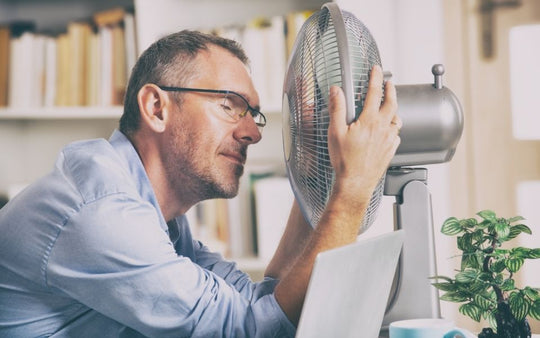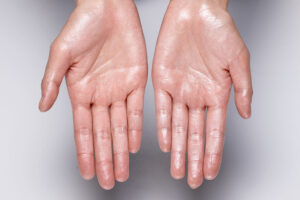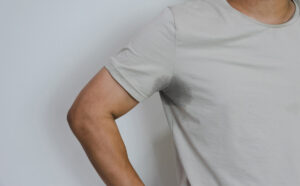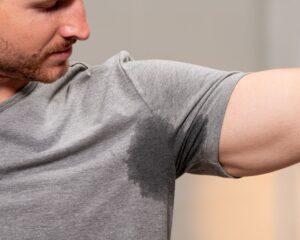Table of Contents
What causes excessive sweating? Unpredictable, profuse sweating can be head scratching. And like some things… there isn’t a one-size-fits-all answer.
Heavy sweating can be caused by overactive sweat glands, genetics, climate, anxiety, or a prescription medication you’re taking.
Excess sweat can also be a symptom of something more serious. In this article we’ll explore some of the reasons you might be sweating a lot.
Why Does My Body Sweat So Much?
Producing sweat is how your body regulates your overall body temperature. Basically, any time your body temperature rises, you produce sweat, which helps cool your body down to normal temperature.
Because your body produces sweat any time your internal temperature rises, there are several things that could impact the amount of sweat you produce, including:
- Anxiety
- Hormone levels
- Outside temperatures
- Medications
- Physical activity
Your body is always sweating — even when you don’t feel it. If you’re lucky, the sweat your body produces evaporates quickly. But if you produce a lot of sweat, it won’t evaporate as it’s produced, and you’ll start to see small droplets on your skin.
You have more than three million sweat glands on your body, so sweat can be produced pretty much anywhere. However, some parts of your body — such as your underarms, the soles of your feet, your groin area, and the palms of your hands — have more sweat glands than other areas. That’s why you might see more sweat production in those areas.
Medical Conditions That Can Cause Excessive Sweating
- Endocarditis
- Diabetic hypoglycemia
- Heat exhaustion
- Fever of undetermined cause
- Hyperthyroidism (overactive thyroid)
- Generalized anxiety disorder
- Heart attack
- Leukemia
- Hyperhidrosis
- Non-Hodgkin’s lymphoma
- Menopause
- Stress
- Tuberculosis
- Obesity
Can Excessive Sweating Be Cured?
While we’d love to tell you there’s a sure-fire cure for excessive sweating, we just can’t. Body chemistry, sweat severity, diet, anxiety levels, and medications can all impact our sweating. Which makes finding that one-size-fits-all cure pretty difficult.
However, there are treatments and lifestyle changes that can help you sweat less.
If you sweat a lot, consider a clinical strength antiperspirant. While not a permanent fix, antiperspirants (not deodorants) can provide temporary relief while you explore a longer term solution to your excessive sweating.
If you’ve tried different home remedies and clinical-strength antiperspirants and haven’t found anything that works, you should consider consulting your doctor for advice. In some cases, doctors and/or dermatologists might prescribe an anticholinergic to help reduce the amount of sweat your body produces. This medication is either prescribed in pill or cream form — depending on which part of your body sweats a lot. For excessive head sweating, some dermatologists use botox injections as a treatment. The botulinum toxin freezes the glands in the treated area so they don’t produce sweat.
Beta-blockers (propranolol) and benzodiazepines also may be prescribed if your excessive sweating is a result of anxiety. While these don’t reduce the amount of sweat you produce, they do help control your anxiety levels, which in turn, reduces sweat production.
Does Sweating Too Much Lead to Dehydration?
You become dehydrated when your body loses more water than you consume. So if you are profusely sweating on a regular basis and you aren’t drinking enough water to replenish the amount your body loses, you could become dehydrated. Normal, non-active people should drink between eight and 12 glasses of water per day. But if you sweat excessively on a regular basis, you should consider increasing your water intake slightly. Even an extra glass or two of water per day could keep you from becoming dehydrated.
What Causes Excessive Sweating on the Head, Neck, and Face?
Facial sweating is common, but it certainly isn’t desirable. In fact, many people battling excessive sweating have the hardest time coping with the stuff that develops on their face and/or neck — mostly because it’s difficult to hide.
Medical conditions, such as diabetes or chronic heart conditions, can cause you to sweat on the head, neck, and/or face, but this type is also caused by anxiety or nerves. Additionally, when it comes to excessive head sweating your diet could be the problem. You should consider eliminating any hard-to-digest foods from your diet to see if that solves your problem.
What Causes Extreme Armpit Sweating?
Excessive underarm sweating is the pits! No one wants to be known at work as the guy or gal with pit stains. Unfortunately, there isn’t one specific cause for extreme underarm sweating. Like other types, it can be caused by a medical condition, nervousness, medications, or overactive sweat glands.
It is important to note that there are more sweat glands on your underarm area. So when your body produces sweat, you’re likely to notice it more there than you would elsewhere on your body. The good news is, with the help of a good antiperspirant, most of the sweat your underarm area produces can be kept at bay.
Will Excessive Sweating Stop After Puberty?
Sometimes excessive sweating is caused by overactive hormones, which is why teenagers, pregnant women, and women in menopause typically sweat more than the average person. The good news is, this also means that if your sweating is caused by overactive hormones, it could stop after puberty. Once the hormones in your body settle down a bit, your body won’t produce as much sweat. In the meantime, consider using a clinical-strength antiperspirant, such as SwaetBlock towelettes, to control the amount of sweat our body produces.
Common Health Problems Associated With Excessive Sweating
Before you decide the best way to stop excessive sweating, you need to determine the cause of the problem. For most people, the cause is simply overactive sweat glands. But sweating a lot can also be a symptom of an underlying medical condition.
Is Excessive Sweating a Sign of Diabetes?
Excessive sweating is one of several symptoms of diabetes. However, diabetes typically causes very specific types of sweating, all of which are common. So you should consult your doctor to determine whether or not diabetes is really your problem.
Night sweats are common in people with diabetes. They are often caused by low blood sugar levels. However, exercising close to bedtime and drinking alcohol in the evening can also cause you to have night sweats. People with diabetes also commonly experience normal hyperhidrosis (excessive sweating), but it’s typically only one of several symptoms. Gustatory sweating is unique to diabetes, though. So if you find yourself breaking a sweat when you’re eating or drinking, you should consult your doctor as soon as possible.
Is Excessive Sweating a Sign of Pregnancy?
Pregnancy hormones and the added weight gain from your pregnancy can both cause a bit of excessive sweating. Once you have the baby and your hormones regulate again, the amount of sweating your body produces should go back to normal though.
In the meantime, try drinking more water. It helps keep you hydrated and regulate your body temperature, which can help reduce the amount of sweat your body produces. Also, try your best to wear lightweight clothing and stay out of the heat. Anything you can do to keep cool will help prevent sweating.
Is Excessive Sweating a Sign of Cancer?
Night sweating is a sign of certain types of cancer such as:
- carcinoid tumors
- leukemia
- lymphoma
- bone cancer
- liver cancer
- mesothelioma
However, you shouldn’t assume that you have cancer just because you sweat more at night. Night sweating is actually really common, and people who experience night seat caused by cancer usually have other symptoms of the disease as well such as rapid weight loss and unexplained fevers.
Is Excessive Sweating a Sign of Heart Disease?
Excessive sweating can be a sign of heart disease. This type of sweating is caused because your body has to work extra hard to push your blood through the clogged arteries in your heart. Even though excessive sweating is one symptom of heart disease, it’s important to note that heart disease usually causes cold sweats and clammy skin. So if you suddenly start randomly breaking out in cold sweats that make your skin feel clammy, you should consult your doctor for further testing.
Medications and Excessive Sweating
If you’ve started a new medication, and then, noticed that you’ve started sweating a lot more, the medicine could be the cause of your problem. Not all medications can cause sweating, though. The side effect is typically associated with painkillers, antidepressants, cardiovascular drugs, and hormonal drugs.
Antidepressants are one of the most common medications that cause sweating. In fact, about 19 percent of people taking an SSRI or SBRI antidepressant report increased amounts of sweating. So if you’re taking Celexa, Zoloft, Prozac, Paxil, Luvox, Lexapro, or Symbyax, and you’ve started breaking out in sweats, you may want to discuss other options with your doctor.
Even though increased sweat production is a sign of a hormonal imbalance, it can also be caused by the medication you take to balance your hormones out. This includes thyroid regulators, endocrine hormones, testosterone drugs, vasopressins, and certain types of birth control, specifically Depo-Provera.
Excessive sweating is also a side effect of analgesic painkillers such as Vicodin, Methadone, OxyContin, Vioxx, Ultram, Celebrex, and any fentanyl-based drug. While it’s most often associated with withdrawal, these medications can cause you to sweat while you take them. Prescription Midol and Aleve can also cause you to sweat more than normal. The good news is, there are other painkillers available. If one of these options increases the amount of sweat you produce, talk to your doctor about switching to prescription-strength IB Profen, Tylenol, or another non-narcotic painkiller.
Medications That Can Cause Excessive Sweating
- Painkillers
- Hormonal medications
- Antidepressants
- Cardiovascular drugs
Lastly, there are 17 classes of cardiovascular drugs that can cause you to sweat profusely. Some of the more common medications include Norvasc, Digitek, Cardura, Zestril, Altace, and Bumex.
When to See a Doctor
Even though hyperhidrosis is annoying and embarrassing, it isn’t a condition that’s medically serious. You should consult your doctor if you are having trouble treating the condition on your own, using clinical-strength antiperspirants and other home remedies. Your doctor may be able to give you a prescription medication or cream that will help you. However, most doctors and dermatologists suggest their patients use clinical-strength antiperspirants before trying prescription-strength medicine.
If you believe that your excessive sweating is caused by a more severe medical condition, you should consult your doctor as soon as possible. If this is the case, you would probably notice all-over body sweating, because it’s more associated with other medical conditions than sweating in one part of your body. Also, there’s a good chance you’ll have other signs of the illness as well. Regardless, no one knows your body the way you do, so if you’re concerned that the excessive sweating you’re experiencing is caused by something more severe, go to the doctor.
If you’re taking medication and you think that medication is causing your excessive sweating, you should also talk to your doctor. You never know, your doctor may be able to suggest a similar medication that doesn’t make you sweat a lot.
The fact is, excessive sweating is always annoying. It can be really embarrassing too. But with a combination of clinical-strength antiperspirants, such as SweatBlock, and your doctor’s recommendations, you can reduce the amount of sweat your body produces.
You might also like...

What is Focal Hyperhidrosis? Symptoms, Treatments, & Tips for Managing It Successfully
Table of Contents Does excessive sweating bother you? Keep you from being social? Or make you feel like you can’t
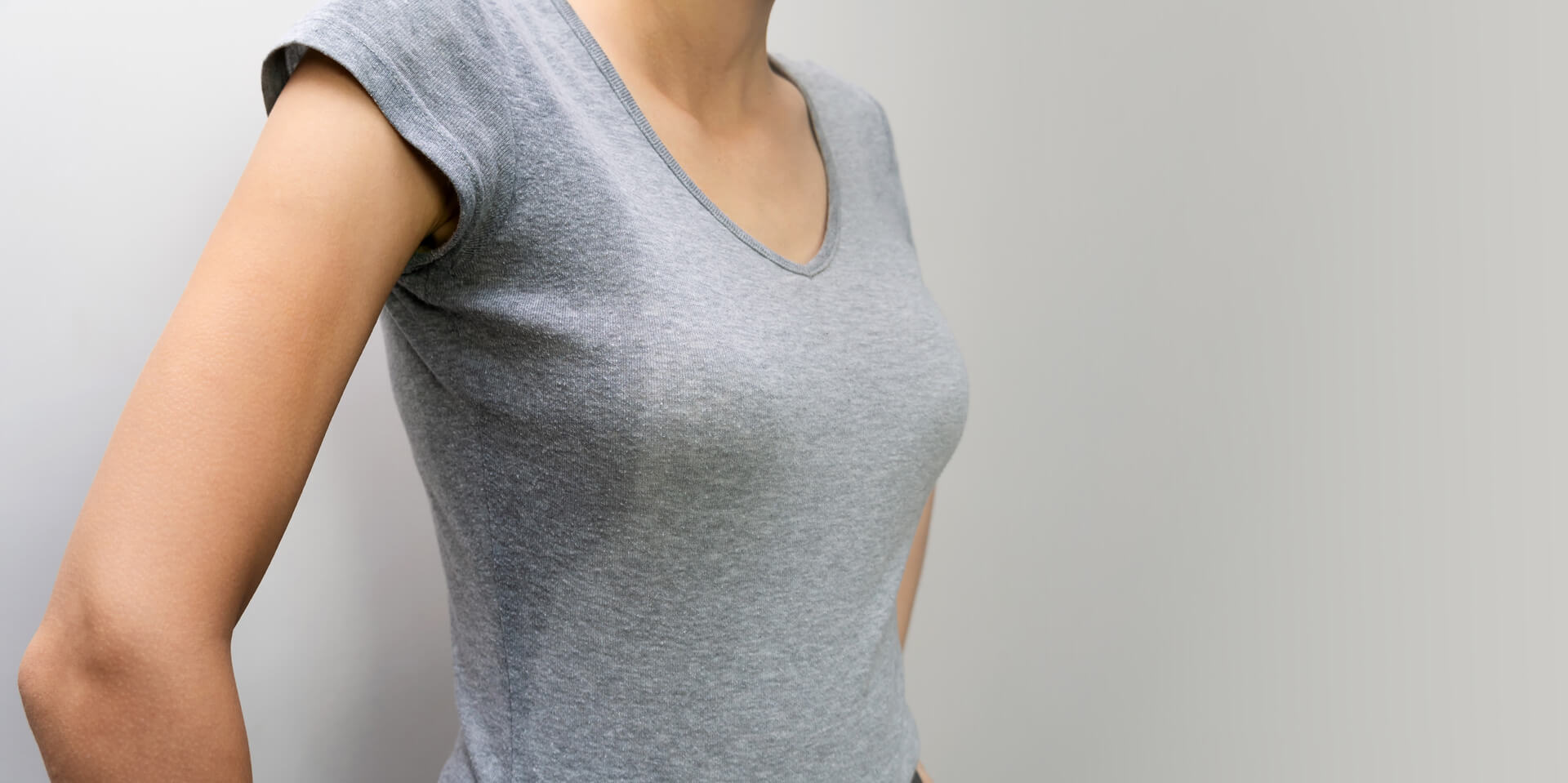
How to Stop Sweating Naturally – Huge List Tips & Home Remedies
Table of Contents For most people, sweating is a totally natural bodily function. For others, it’s a nonstop nightmare. Excessive

How to Stop Sweating So Much? 9 Tips to Beat Unwanted Sweat
If you’ve ever suffered through an awkward sweaty hug, a slippery handshake, or a sweat-soaked job interview — this article




